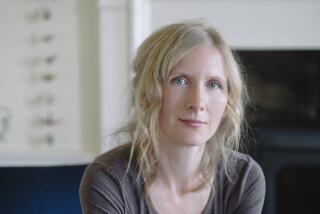For Inuit, Astronaut’s Tale Is From Another World
- Share via
RESOLUTE BAY, Canada — The ancient language of the Inuit, the nomadic hunters of the Arctic, is said to have more than 20 words for snow and a dozen ways to convey the direction “over there.” But there are no words in Inuktitut for “space station,” “gravity” or “weightless,” which presented interpreter Susan Salluviniq with something of a problem when an astronaut came to town.
The astronaut, Chris Hadfield, a veteran of two space shuttle missions and one of the Canadian Space Agency’s biggest stars, was passing through this remote polar hamlet recently on his way to a science mission on a nearby island and volunteered to speak about the wonders of outer space at an impromptu community gathering.
So with just a few minutes’ notice, some two dozen of Resolute Bay’s 250 residents eagerly trekked up a rocky hill to the town gymnasium, where they enthusiastically greeted their rare celebrity visitor. There were grizzled town elders just back from the day’s caribou hunt, a mother nursing a tiny infant and teenagers with iPod headphones dangling around their necks.
Outside, the sun shone brightly, as it does 24 hours a day at this time of year.
Hadfield brought up a picture of the International Space Station on the screen of his laptop computer and launched into what he expected would be his standard stump speech about the space program and what it’s like to fly above the Earth, a presentation he had given at schools, churches and Rotary clubs across Canada hundreds of times before.
Pretty soon, however, it became clear that this was not going to be an ordinary presentation. Strange things happen, it turns out, when a 21st century spacefarer tries to explain his world to a group of aboriginals who still sometimes use spears when hunting polar bears on the frozen Arctic Ocean.
“Has anybody reached the moon yet?” asked David Kalluk, 65, Resolute’s most experienced polar bear hunter.
Yes, Hadfield answered, after taking a moment to absorb the question. Twelve men have walked on the moon, he explained.
“Since there are so many holes in the ozone layer already, maybe you should stop launching rockets so you don’t tear any more,” another man suggested.
No, the astronaut replied, holes in the ozone layer are not caused by rockets but by chemicals that human beings release into the atmosphere.
“How do you go to the bathroom in space?” asked a middle-aged woman.
The last question, at least, Hadfield had encountered many times, and he proceeded with a polite explanation of how weightlessness affects various bodily functions.
“Slow down, I’m having trouble translating this,” pleaded Salluviniq, Resolute’s mayor and the town’s resident professional Inuktitut translator. “We don’t really have a word for ‘weightless.’ ”
On the fly, Salluviniq rendered “gravity” with the Inuit word for “magnet,” the closest familiar concept she could come up with. “Weightless” came out something like “not heavy,” and “space station” became “a home in space.”
The words worked well enough for Simeonie Amagoalik, 72, who arrived in Resolute in 1953 with the first group of Inuit families forcibly settled in the town by the Canadian government as part of a plan to assert the nation’s sovereignty by populating the Arctic.
Amagoalik pondered the concept of weightlessness and then raised his hand with a question.
“So, in space, everything is free?” he asked.
Hadfield waited for Salluviniq’s translation. Then he looked up, puzzled. “I don’t quite understand your question,” he said.
This time it was Amagoalik’s turn to be patient.
“Here in Resolute,” he explained, “we pay for things by weight. In space, everything is weightless. So that must mean everything is free?”
Hadfield smiled as began to grasp the elder’s logic.
“No, I’m afraid everything in space is actually very expensive,” he said.
The Inuit elders, more accustomed to hunting seals and building ice houses than contemplating rocket science, may not have understood all the fine points of Hadfield’s presentation. But in their own way, of course, bearing thousands of years of collective wisdom handed down by their ancestors, they know more about the land and the ocean and the sun and the stars than any NASA expert could ever tell them.
Which is not to say that they don’t make use of the modern tools the space program has brought to them.
After the meeting, for example, one hunter spread open a satellite map of the ice floes around Resolute that he had printed off the Internet a few hours before.
“Oh, can I borrow that?” asked another hunter. “I’m headed out for caribou tomorrow and I can use it.”
More to Read
Sign up for The Wild
We’ll help you find the best places to hike, bike and run, as well as the perfect silent spots for meditation and yoga.
You may occasionally receive promotional content from the Los Angeles Times.






